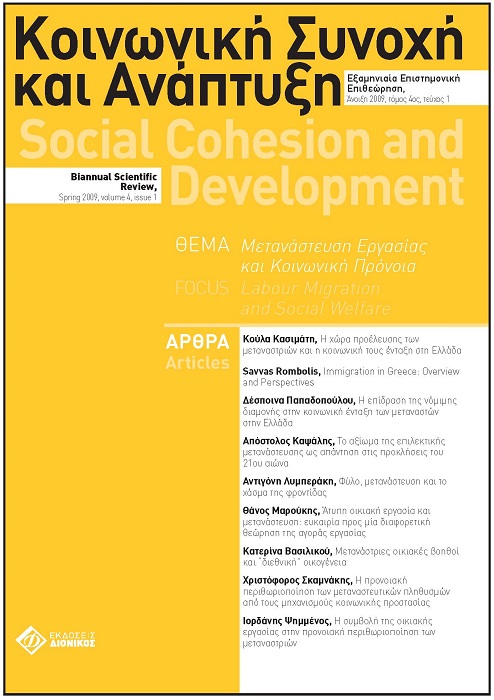Τhe axiom of selective migration as the answer to the challenges of the 21st century

Abstract
The country-members of the European
Union, faced with common challenges, are
required in the economic conjuncture that
they are currently faced with to take weighty
decisions as regards an up to date migration
policy. Fighting for the axiom of selective
migration has recently constituted the offi cial
answer of Europe to the challenges of the 21st
century. Nevertheless, it is doubtful whether
its implementation will actually manage to
satisfy the specifi c needs of each countrymember,
or if there still is sincere and
implicit confi dence through all the involved
parts as regards its suitability. According to
the initial indications, selective migration is
destitute of several innovation elements and
simultaneously the prospects of achieving
the pursued objectives are probably narrow.
Article Details
- How to Cite
-
Καψάλης Α. (2016). Τhe axiom of selective migration as the answer to the challenges of the 21st century. Social Cohesion and Development, 4(1), 63–76. https://doi.org/10.12681/scad.8906
- Section
- Articles

This work is licensed under a Creative Commons Attribution-NonCommercial-ShareAlike 4.0 International License.
Authors who publish with this journal agree to the following terms:
- Authors retain copyright and grant the journal right of first publication with the work simultaneously licensed under a Creative Commons Attribution Non-Commercial License that allows others to share the work with an acknowledgement of the work's authorship and initial publication in this journal.
- Authors are able to enter into separate, additional contractual arrangements for the non-exclusive distribution of the journal's published version of the work (e.g. post it to an institutional repository or publish it in a book), with an acknowledgement of its initial publication in this journal.
- Authors are permitted and encouraged to post their work online (preferably in institutional repositories or on their website) prior to and during the submission process, as it can lead to productive exchanges, as well as earlier and greater citation of published work (See The Effect of Open Access).


